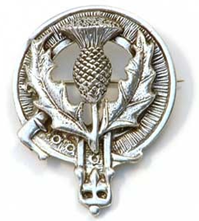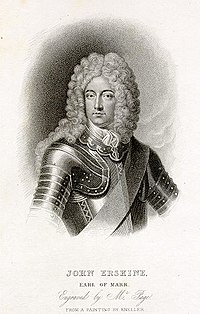 |
|||

Best viewed in
|
The Braes of Mar is an 18th century Scots tune. It is in Bremner's Reels, (circa 1758). The words are a later addition, appearing in Hogg's Jacobite Relics (1821). The tune commemorates the raising of the Stewart standard by John Erskine, 6th Earl of Mar at Braemar on September 6, 1715. However, the words refer to Bonnie Prince Charlie, who led the uprising of 1745. John Erskine, Earl of Mar, KT (1675 – May 1732) was a Scottish Jacobite who was the eldest son of Charles, Earl of Mar (who died in 1689), from whom he inherited estates that were heavily loaded with debt. He was the 23rd Earl of Mar in the first creation of the earldom. He was also the sixth earl in the seventh creation (of 1565). He was nicknamed "Bobbing John", for his tendency to shift back and forth from faction to faction, whether from Tory to Whig or Hanoverian to Jacobite. Deprived of office by the new king in 1714, Mar raised the standard of rebellion against the Hanoverians; at the battle of Sheriffmuir in November 1715, Mar's forces outnumbered those of his opponent, but victory eluded him. At Fetteresso his cause was lost, and Mar fled to France, where he would spend the remainder of his life. The parliament passed a Writ of Attainder for treason against Mar in 1716 as punishment for his disloyalty, which was not lifted until 1824. He died in 1732.
This
standard is supposed to have been made by the Earl's lady, and was very
elegant; the color was blue, having on the one side the Scottish arms
wrought in gold, and on the other the Scottish thistle, with these words
beneath, "No Union," and on the top the ancient motto "Nemo me impune
lacessit." It had pendants of white ribbon, one of which had these words
written upon it, "For our wronged king, and oppressed country;" the
other ribbon had, "For our lives and liberties."
Lyrics
· Erskine, Earl of Mar, commander-in-chief of the Chevalier's army. He proclaimed James the eighth, and raised his standard at Castletoun of Brae-Mar, September 6th, 1715. He died in France, 1732. · Drummond, marquis of Drummond, lieutenant-general of James's army, "a nobleman of great spirit, honor, and abilities." He died in France about 1717. · Macdonald of Glengary, "a brave and spirited chief," attainted. · Macgregor—Rob Roy Macgregor, brother to the laird of Macgregor, and hero of the novel which bears his name. · Murray, marquis of Tullibardine: died in the Tower of London, 1746. · Rollo—lord Rollo, "a man of singular merit and great integrity," he died in 1758. · Keith, earl marischal of Scotland: died in Switzerland, 1771. · Maule, earl of Panmure: died in Paris, 1723. · Harry Maule, brother to the earl of Panmure, "who with every personal accomplishment, possessed great intrepidity, military skill," &c. died about 1740. · Ranald Macdonald, captain of clan-Ranald. "He was the most gallant and generous young gentleman among the clan:" he fell in the field of battle. · Mackenzie, earl of Seaforth: died 1740. · Macgillvary: a name applied to the clans in general.
|
||

